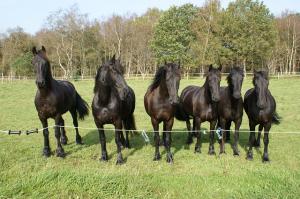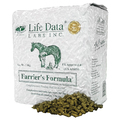For the last decade, the number of horse welfare cases has increased significantly, as horse overpopulation becomes a growing concern in this country. Too many horses are being bred which means, with fewer people now able to afford them, many are being neglected, fly-grazed, or passed over to charities.
Because of this, huge pressure is being placed on rescue centres and sanctuaries across the UK, which are struggling to cope with the volume of unwanted horses. Unfortunately, if this trend continues, it is likely that a large number of healthy animals will be euthanised because there is nowhere else for them to go.
Irresponsible dealers are to blame for the problem, by indiscriminately continuing to breed and sell, despite market saturation meaning that the price of horses has plummeted. Some sources indicate that horses and ponies can be acquired for as little as £5 at auction, while others are offered up just as cheaply and yet remain unsold.
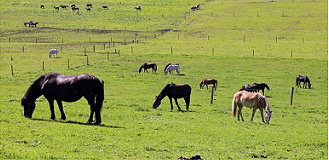 This goes to show just how many unwanted horses there are. The poor economic climate hasn’t aided the situation either, as fewer people can afford the weekly expenditure (approx. £100) required to care for a horse, which takes into account feed, shelter, routine care and veterinary costs.
This goes to show just how many unwanted horses there are. The poor economic climate hasn’t aided the situation either, as fewer people can afford the weekly expenditure (approx. £100) required to care for a horse, which takes into account feed, shelter, routine care and veterinary costs.
Also, because the equine market has become saturated in recent years, many horses are of poor stock, meaning they have very little sale value. This has resulted in many being sold cheaply to the meat trade and exported across Europe.
If charities won’t agree to take them and they aren’t sold to abattoirs, most unwanted horses are left to fend for themselves on private land (reserved for livestock), or are being let loose for the authorities to deal with. While the trend is also apparent for cats and dogs, the horse overpopulation crisis is more extreme.
To try and tackle the problem, the British Horse Society (BHS) is proposing to hold ‘castration clinics’ in the autumn of 2015 and spring of 2016 in a bid to reduce the number of horses being bred. The clinics will be held at least once in every region and nation that the BHS operates.
Castration won’t be free to everyone, but it will be subsidised to those who are struggling to pay for the procedure themselves. Boarding a horse in a rescue costs the taxpayer money (roughly £8 a day), which the BHS suggest could be better spent on clinics for castrating horses.
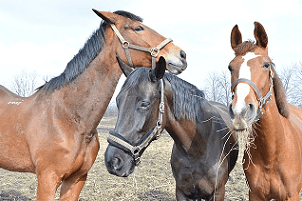 Horses brought to the clinics won’t just be castrated either – they will also be given a health check by a trained vet, as well as advice and support on a range of issues offered to their owners. Not only is the BHS’s proposal financially beneficial, it will prevent a lot of suffering to potential future foals.
Horses brought to the clinics won’t just be castrated either – they will also be given a health check by a trained vet, as well as advice and support on a range of issues offered to their owners. Not only is the BHS’s proposal financially beneficial, it will prevent a lot of suffering to potential future foals.
How many unwanted foals will this prevent? It’s impossible to say, but in a few generations it is easy to see how the number could well be into the thousands."
Today, it is thought there are roughly one million horses in the UK, most of which are privately owned leisure horses. This means that breeding is largely unregulated and this is particularly evident in the travelling community.
The unrestricted breeding of their horses results in unwanted foals that then cannot be cared for. This is when fly-grazing becomes an issue.
Surplus stock, decreased demand and therefore decreased value has meant that many horses are at the mercy of irresponsible owners who will happily abandon them to the care of others. Because there are limited resources for catching offenders and because most fly-grazing takes place after dark when horses can be transferred to private fields unobserved, policing the activity is difficult.
Add to this the fact that most horses abandoned in this way are without freeze-marks or microchips to identify them, making locating the owners a nigh-on impossible task.
A new bill in Wales (The Control of Horses Act 2014) means that local authorities, police and animal welfare charities will maintain the right to seize, sell, re-home and humanely euthanise (as a last resort) any horse that trespasses private land without consent of the landowner.
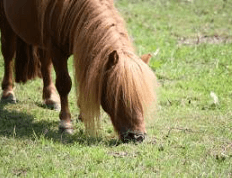 This removes the problem of rogue horses over-grazing the land and clearing fields of grasslands and pasture destined for the landowner's livestock. It also reduces the risk of harm coming to the farmer or landowner from animals that are unruly, distressed or unwell, as well as the likelihood of over-breeding.
This removes the problem of rogue horses over-grazing the land and clearing fields of grasslands and pasture destined for the landowner's livestock. It also reduces the risk of harm coming to the farmer or landowner from animals that are unruly, distressed or unwell, as well as the likelihood of over-breeding.
If you have any comments on the horse overpopulation crisis, please share them with our other readers! Feel free to contact me directly with any further questions or suggestions: [email protected]
Written by: Hannah
